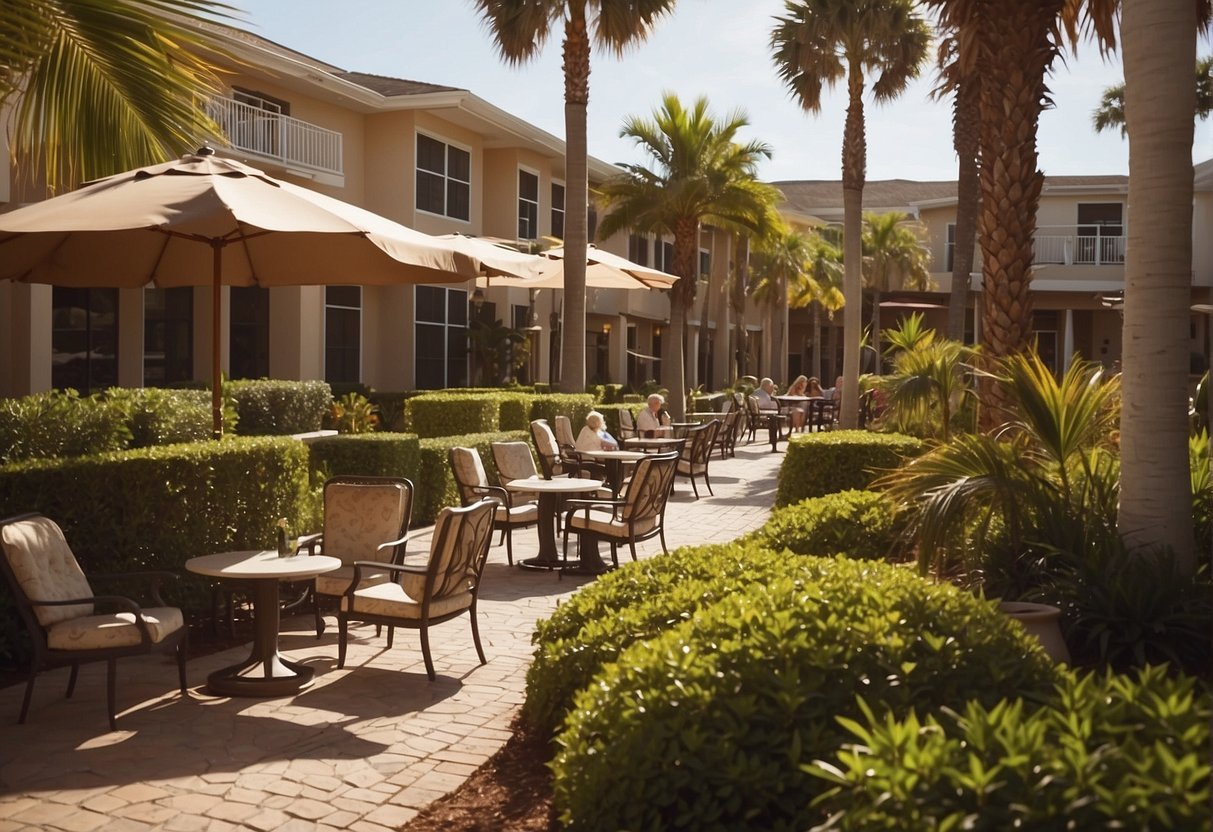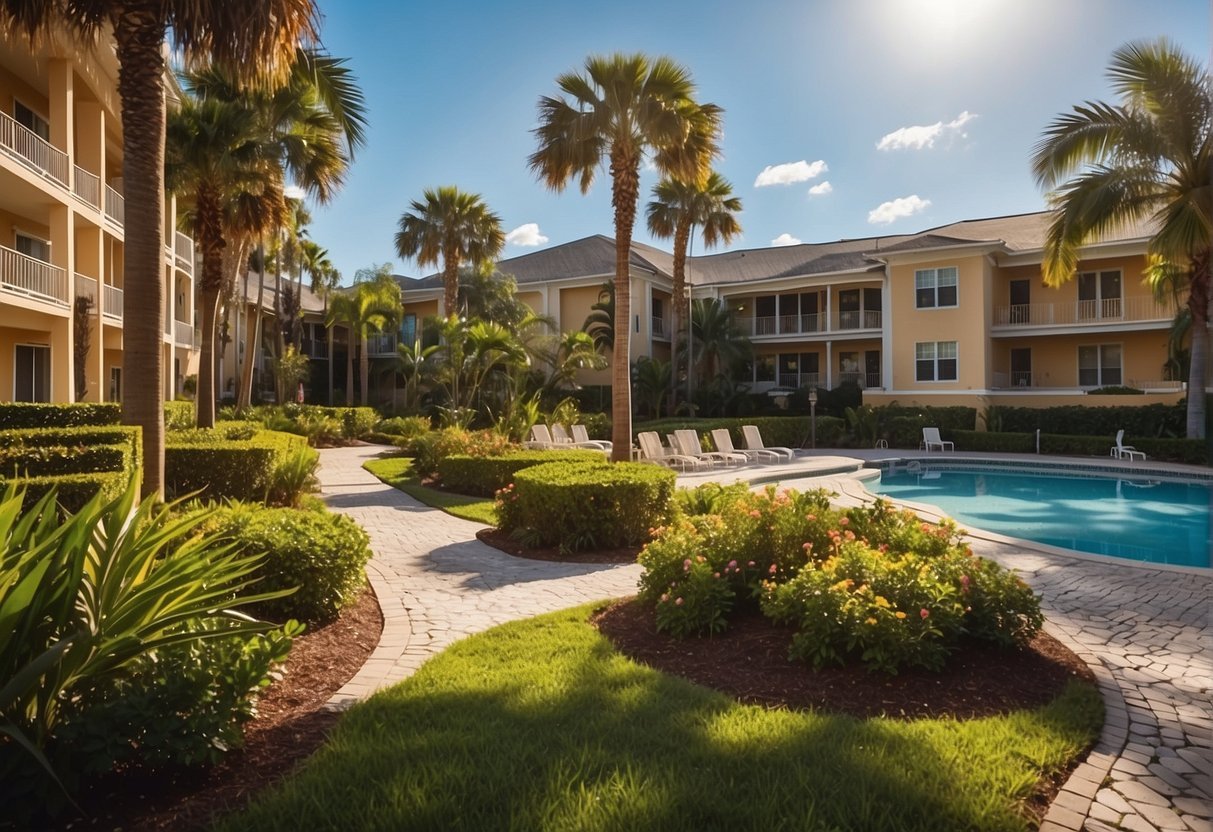Coût de la vie assistée en Floride – Guide financier 2024 pour les personnes âgées
Assisted living in Florida offers a range of options for seniors looking for a supportive living environment. Florida is a popular retirement destination with its warm climate and abundant recreational activities.
However, the cost of assisted living varies widely across the state and can be influenced by several factors, such as location, room size, and the level of care required. Understanding these costs is essential for planning and budgeting for future needs.

Financing options for assisted living are varied, encompassing personal savings, pensions, long-term care insurance, Medicaid, and other government programmes like Optional State Supplementation (OSS).
With careful consideration, seniors and their families can navigate the financial complexities to find a suitable assisted living community that provides the necessary care while aligning with their budget. It’s essential to thoroughly research and compare different facilities to make informed decisions about this critical stage of life.
Cost of Assisted Living in Florida – Key Takeaways
- The cost and options for assisted living in Florida vary by location and required services.
- Various financial assistance programmes can help manage the expenses of assisted living.
- Thorough research into assisted living facilities will lead to informed decision-making.
Understanding Assisted Living in Florida

Evaluating the options for senior living in Florida means understanding what assisted living offers and how it compares to other forms of care. This choice can significantly affect your lifestyle, care levels, and financial planning.
Definition and Levels of Care
Assisted living communities in Florida provide a blend of personal care et indépendance. These communities are designed for individuals who may need assistance with daily activities but do not require the intensive care of a nursing home. Levels of care in these settings can range from essential personal care support to more comprehensive long-term care services, which may include:
- Gestion des médicaments
- Bathing and dressing
- Meal preparation and nutrition
- Housekeeping and maintenance
- Activités sociales et récréatives
For residents with dementia or Alzheimer’s disease, many facilities offer memory care services featuring secure environments and tailored programs.
Assisted Living vs Other Forms of Senior Living
Assisted living differs from other senior living options available in Florida:
- Retirement Community: Retirement communities typically aim at seniors who can live independently. In contrast, assisted living offers additional support with daily activities.
- Nursing Home/Skilled Nursing: Skilled nursing facilities provide more intensive, round-the-clock medical care than assisted living. They cater to those with severe health conditions requiring constant monitoring.
- Home Care: While home care services enable seniors to stay home, assisted living communities offer the added benefit of social interaction and activities within a safe, managed environment.
When choosing between these options, consider the level of care you require, the desire for community involvement, and the relative costs involved. Assisted living strikes a balance, offering personal care within a community setting, often making it an attractive option for seniors seeking assistance and independence.
Cost Factors for Assisted Living
The costs of assisted living in Florida can differ vastly based on location and additional services.
Average Cost in Key Florida Cities
- Miami: The vibrant city of Miami may see higher monthly costs given its metropolitan nature, often surpassing the state average.
- Orlando: As a bustling urban area, Orlando’s cost tends to align closely with Florida’s average.
- Naples: Renowned for its affluence, Naples might reflect higher assisted living costs.
- The Villages: A highly sought-after retirement community, It can exhibit costs reflective of its specialised offerings.
- Jacksonville: A mix of urban setting and vast area size can lead to a broad range of costs in Jacksonville.
Additional Expenses to Consider
Aside from basic living costs, you’ll need to account for:
- Medication Management: Ensuring the correct medication administration is often expensive.
- Daily Activities: Enhanced programmes or excursions outside the standard offerings might incur extra fees.
- Coût de la vie: Fluctuations in the cost of living across Florida cities impact the overall expenses in assisted living facilities.
Remember to factor these variables into your budget to understand the total cost better.
Financial Assistance and Insurance
In Florida, assisted living costs can be significant, but various financial aid programmes and insurance options may help manage these expenses. Understanding what assistance is available to you and how to access it is crucial for making informed decisions about long-term care.
Government Programmes and Eligibility
- Medicaid: The Statewide Medicaid Managed Care Long-Term Care Program (SMMC LTC) provides help for eligible elderly residents who require nursing-home-level care but prefer to remain at home or in an assisted living facility. To qualify, you must meet certain income and asset requirements.
- Revenu: Below a specified limit, which may change annually.
- Assets are also subject to limits, with specific personal property and housing exemptions.
- Supplemental Security Income (SSI) and Optional State Supplementation (OSS): If your income is below the Federal Benefit Rate, SSI and OSS may offer additional financial support.
- Area Agency on Aging: This local resource can provide information on Community Care for the Elderly (CCE) and Home Care for the Elderly (HCE) programmes to assist seniors living independently.
Private Funding and Insurance Options
- Long-Term Care Insurance: A policy can cover some of the costs of assisted living, but it’s crucial to purchase before you require services due to stringent underwriting.
- Personal Savings and Investments: Assess your assets and consider whether investments, savings, or a reverse mortgage can support your long-term care needs.
- Veterans Benefits: If you are a veteran or the surviving spouse of one, you may have additional benefits available to help with long-term care costs.
Ensuring you are well-informed about the financial options available can alleviate the stress of funding long-term care. Look into each possible avenue thoroughly, and consider seeking advice from financial experts or the Florida Department of Elder Affairs for guidance tailored to your situation.
Choosing the Right Assisted Living Community
When evaluating various assisted living communities in Florida, it’s crucial to focus on the amenities and services available and consider the safety and location of the facilities to ensure they meet your specific needs.
Assessing Amenities and Services
- Examine the Services: Check for including support with activities of daily living (ADLs) such as bathing, dressing, and medication management.
- Analyse the Amenities: Look for value-added services, such as on-site health care, fitness programs, and transportation.
Remember, the type and quality of amenities can influence elder care costs. Research if the communities offer sliding scale fees or accept waivers, which can assist with managing the costs.
Safety and Location Considerations
- Prioritise Safety: Ascertain that sound safety measures, like emergency response systems and security personnel, are in place.
- Geographic Location: Evaluate the community’s location; features like proximity to family, medical facilities, and recreational areas can affect the overall value. Places like Homosassa might offer a different cost structure compared to larger cities.
Check how each facility aligns with the Cost of Care Survey by Genworth to ensure the costs align with state averages. Also, it’s wise to plan for potential home modifications or alternative housing options if the need for more comprehensive institutional care arises.






